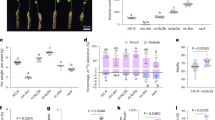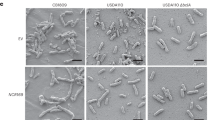Abstract
LEGHAEMOGLOBIN (Lb), a haem protein with structural and functional similarities to animal myoglobin1, is found uniquely in legume root nodules,the sites of nitrogen fixation which form during symbiotic association between legumes and soil bacteria of the genus Rhizobium. Alhough in certain conditions free-living Rhizobium can express nitrogenase activity in the absence of Lb (see, for example, ref. 2), the presence of the protein seems to be required for the development of nitrogenase activity by Rhizobium bacteroids within legume root nodule cells. Lb probably functions by transporting oxygen to Rhizobium bacteroids, at the same time maintaining a low partial pressure of oxygen to protect nitrogenase from oxygen-inactivation.
This is a preview of subscription content, access via your institution
Access options
Subscribe to this journal
Receive 51 print issues and online access
$199.00 per year
only $3.90 per issue
Buy this article
- Purchase on Springer Link
- Instant access to full article PDF
Prices may be subject to local taxes which are calculated during checkout
Similar content being viewed by others
References
Appleby, C. A. in The Biology of Nitrogen Fixation (ed. Quispel, A.) 521–554 (North-Holland, Amsterdam, 1974).
Kurz, W. G. W. & La Rue, T. A. Nature 256, 407–409 (1975).
Dilworth, M. J. Biochim. biophys. Acta 184, 432–441 (1969).
Cutting, J. A. & Schulman, H. M. Biochim. biophys. Acta 229, 53–62 (1971).
Sidloi-Lumbroso, R. & Schulman, H. M. Biochim. biophys. Acta 476, 295–302 (1977).
Harrison, P. R., Hell, A., Birnie, G. D. & Paul, J. Nature 239, 219–221 (1972).
Harrison, P. R., Birnie, G. D., Hell, A., Humphries, S., Young, B. D. & Paul, J. J. molec. Biol. 84, 539–554 (1974).
Lewin, B. Cell 4, 77–93 (1975).
Hell, A., Young, B. D. & Birnie, G. D. Biochim. biophys. Acta 442, 37–39 (1976).
Verma, D. P. S., Nash, D. T. & Schulman, H. M. Nature 251, 74–77 (1974).
Marmur, J. J. molec. Biol. 3, 208–218 (1951).
Stern, H. Meth. Enzym. 12, 100–107 (1978).
Smith, D. B. & Flavell, R. B. Biochem. Genet. 12, 243–256 (1974).
Galau, G. A., Smith, M. J, Britten, R. J. & Davidson, E. H. Proc. natn. Acad. Sci. U.S.A. 74, 2306–2310 (1977).
Ranjekar, P. K., Pallotta, D. & Lafontaine, J. G. Biochim. biophys. Acta 425, 30–40 (1976).
Hepburn, A. G., Gurley, W. B. & Key, J. L. Colloques natn. Cent. natn. Rech. scient. 261, 113–116 (1977).
Goldberg, R. B. Biochem. Genet. 16, 45–68 (1978).
Author information
Authors and Affiliations
Rights and permissions
About this article
Cite this article
SIDLOI-LUMBROSO, R., KLEIMAN, L. & SCHULMAN, H. Biochemical evidence that leghaemoglobin genes are present in the soybean but not in Rhizobium genome. Nature 273, 558–560 (1978). https://doi.org/10.1038/273558a0
Received:
Accepted:
Issue Date:
DOI: https://doi.org/10.1038/273558a0
This article is cited by
-
The detection of leghemoglobin-line sequences in legumes and non-legumes
Plant Molecular Biology (1985)
-
Appraisal of studies on induction of peroxidase and associated porphyrin metabolism
The Botanical Review (1980)
Comments
By submitting a comment you agree to abide by our Terms and Community Guidelines. If you find something abusive or that does not comply with our terms or guidelines please flag it as inappropriate.



